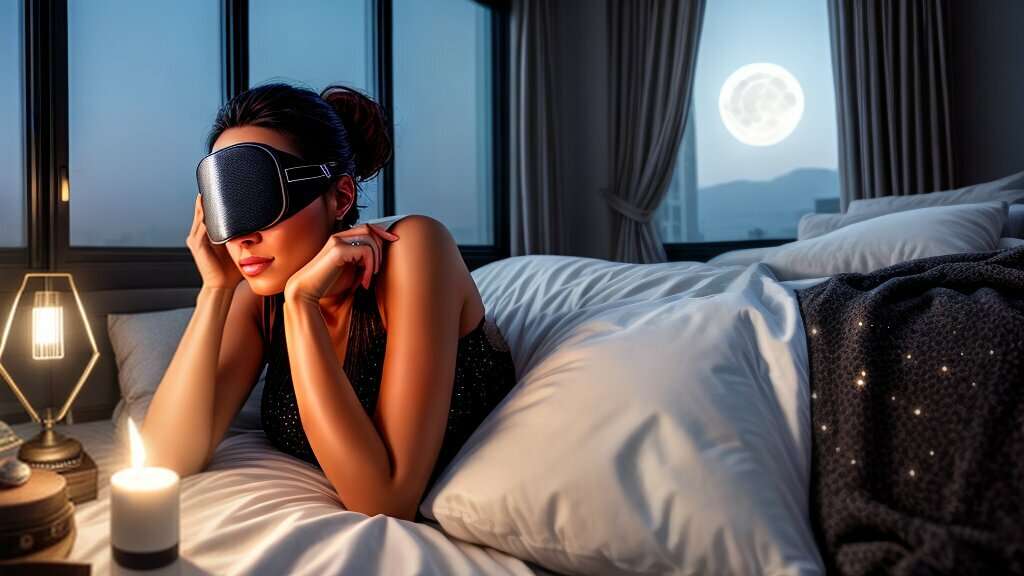Vivid Dreams After Concussion: Insights & Expert Advice
Some of our posts on Dreamtold.com contain affiliate links. If you click on an affiliate link and make a purchase, we may receive a commission. Clicking on an affiliate link that earns a commission does NOT result in additional charges or costs you extra. Earnings from affiliate links help keep this website running. See our full affiliate disclosure here.
If you’ve had a concussion, you may have experienced vivid dreams that seem all too real. These dreams can be unsettling and affect your sleep quality, making recovery more difficult. In fact, vivid dreams are a common symptom of post-concussion syndrome.
In this article, we’ll explore the connection between concussions and vivid dreams, the factors that contribute to dream disturbances, and expert advice on how to manage them. We’ll also discuss the impact of concussions on sleep patterns and the potential neurologic changes that can alter dreaming.
Whether you’re recovering from a concussion or just curious about the connection of vivid dreams after concussion, this article has you covered. Keep reading to learn more.
Key Takeaways:
- Vivid dreams are a common symptom of post-concussion syndrome.
- Concussions can affect sleep patterns and lead to altered dreaming.
- Factors such as the severity and location of the brain injury can influence the occurrence of vivid dreams.
- Managing sleep and creating a conducive sleep environment can help alleviate dream disturbances.
- Seeking professional help may be necessary for persistent dream disturbances post-concussion.
Understanding Vivid Dreams and Dream Disturbances
After a concussion, individuals may experience vivid dreams or dream disturbances, which can impact their sleep quality and overall well-being. But what exactly are vivid dreams, and why do they occur after a head injury?
Vivid dreams are dreams that feel particularly intense, realistic, and memorable. They are often accompanied by strong emotions and can be difficult to differentiate from reality. Dream disturbances, on the other hand, refer to any disruptions in the normal sleep cycle that can lead to changes in dream quality or recall.
There are several factors that can contribute to dream disturbances after a concussion. First, there is often an increase in dream recall, which means that individuals may be more likely to remember their dreams. This is thought to be due to changes in the brain’s processing of sensory information and memory consolidation.
Additionally, the physical trauma of the concussion can lead to neurologic changes that affect sleep patterns and dream formation. These changes may impact the amount of time spent in rapid eye movement (REM) sleep, which is the sleep stage associated with dreaming.
Overall, understanding the nature of vivid dreams and dream disturbances can help individuals and their healthcare providers better manage sleep-related symptoms after a concussion.

The Relationship Between Concussion and Sleep Disturbances
Concussions are notorious for causing sleep disturbances in affected individuals. These disturbances can have a significant impact on an individual’s physical and emotional well-being, leading to further complications if not addressed promptly.
A brain injury, such as a concussion, can alter the structure and function of the brain, leading to changes in sleep patterns. These changes can manifest in different ways, such as difficulty falling asleep, waking up frequently during the night, and experiencing vivid dreams during sleep. In some cases, individuals may also have difficulty finding a comfortable sleeping position or remaining asleep for an adequate amount of time.
Studies have shown that these sleep disturbances can persist even after other concussion symptoms have resolved, leading to a condition known as post-concussion syndrome (PCS). In PCS, the brain’s neurologic functioning can be altered, leading to persistent problems with sleep and other symptoms such as headache, dizziness, and cognitive impairment.

The underlying mechanisms causing sleep disturbances after a concussion are not yet fully understood. However, researchers believe that the changes in the brain’s chemistry and structure caused by the injury contribute to altered sleep patterns. Specifically, alterations in neurotransmitters such as serotonin and melatonin, which regulate sleep-wake cycles, can disrupt an individual’s regular sleeping pattern, leading to difficulties in falling asleep, staying asleep, and waking up feeling rested.
How Concussions Affect REM Sleep
Concussions can cause significant neurologic changes in the brain, including alterations in REM sleep. REM sleep is a crucial stage of the sleep cycle that typically occurs multiple times throughout the night, and is characterized by rapid eye movements and increased brain activity.
Research has shown that individuals with post-concussion syndrome often experience disruptions in REM sleep, with some studies suggesting that these alterations may contribute to the occurrence of vivid and intense dreams. During REM sleep, the brain is particularly active, and memories and emotions are processed and consolidated. Therefore, any changes in this sleep stage can have significant impacts on an individual’s dreaming experience.
Furthermore, alterations in REM sleep can have broader impacts on an individual’s overall well-being. Sleep disturbances, including those caused by disruptions in REM sleep, have been linked to numerous negative health outcomes, including increased risk of depression, anxiety, and cognitive impairment. Therefore, it is critical to manage sleep disturbances post-concussion to support overall rehabilitation and recovery.

There is still much to learn about the precise nature of REM sleep alterations in individuals with concussions. However, healthcare providers can offer strategies and interventions to support individuals experiencing sleep disturbances post-concussion. These may include establishing a consistent sleep routine, creating a conducive sleep environment, and practicing relaxation techniques to promote restful sleep.
Factors Influencing Vivid Dreams After Concussion
Several factors can influence the occurrence of vivid dreams after a concussion. The severity and location of the brain injury are significant determinants of the likelihood and intensity of dream disturbances. According to research, individuals who experience injuries to the temporal or frontal lobes of the brain are more likely to experience vivid and emotionally charged dreams. Additionally, some studies suggest that female individuals may be more prone to experiencing dream disturbances after a concussion.
Another factor that can contribute to vivid dreams after a concussion is the use of certain medications. Medications that affect serotonin levels, such as antidepressants, can alter sleep patterns and increase the likelihood of vivid dreams. It is essential to inform healthcare providers of any medications or supplements being taken during the recovery process.
Individual characteristics can also play a role in the occurrence of vivid dreams after a concussion. Some research suggests that individuals who are naturally high in creativity or have a history of frequent or intense dreaming may be more prone to dream disturbances after a head injury.
Factors Influencing Vivid Dreams After Concussion – Table
| Factors | Impact on Vivid Dreams |
|---|---|
| Severity and location of brain injury | Increase likelihood and intensity |
| Use of certain medications | Alters sleep patterns and increases likelihood |
| Individual characteristics | High creativity or history of frequent dreaming increase likelihood |

Managing Vivid Dreams and Promoting Restful Sleep
Managing dream disturbances after a concussion can be challenging, but there are several strategies that can help promote restful sleep. Establishing a consistent sleep routine is key, as it can help regulate the body’s natural sleep-wake cycle. This may involve setting a regular bedtime and wake-up time, avoiding stimulating activities before bedtime, and creating a calming sleep environment.
Another effective strategy is to engage in relaxation techniques before bedtime. This can include deep breathing exercises, meditation, or yoga. These techniques can help alleviate stress and promote a sense of calm, making it easier to fall asleep and stay asleep throughout the night.
It’s also important to avoid activities that can interfere with sleep, such as consuming caffeine or alcohol close to bedtime. Additionally, individuals should avoid using electronic devices, such as phones or laptops, before bed, as the blue light emitted by these devices can disrupt sleep patterns.
If these strategies are not effective in managing dream disturbances, it may be necessary to seek professional help. Sleep specialists and neurologists can help diagnose and address underlying issues, such as sleep apnea or other sleep disorders, that may be contributing to the problem.

Overall, managing dream disturbances after a concussion requires patience and persistence. By implementing a combination of lifestyle modifications and seeking professional help when necessary, individuals can improve their overall sleep quality and promote healing after a head injury.
Seeking Professional Help for Persistent Dream Disturbances
If you continue to experience persistent dream disturbances after a concussion, seeking professional help is crucial for managing your symptoms and promoting restful sleep. It is important to work with healthcare providers who specialize in sleep disorders and post-concussion syndrome to identify and address underlying issues.
One option is to consult with a sleep specialist who can conduct a comprehensive evaluation and recommend personalized treatment options. They may suggest cognitive-behavioral therapy, relaxation techniques, or medication, depending on your unique needs.
Additionally, a neurologist can help diagnose any underlying neurologic changes that may be contributing to your vivid dreams. They may also recommend further testing, such as a sleep study or brain imaging, to better understand the nature and severity of your symptoms.
Remember that seeking professional help is not a sign of weakness, but rather a proactive step towards supporting your recovery and restoring your quality of life. It is important to be honest and open with your healthcare provider about your symptoms and concerns, as well as any medications or supplements you may be taking.

Other Considerations in Concussion Recovery and Sleep
While managing vivid dreams and promoting restful sleep is crucial in concussion recovery, there are other important considerations to keep in mind for overall healing.
First, maintaining good sleep hygiene is essential. This includes establishing a consistent sleep schedule, creating a peaceful sleep environment, and limiting screen time before bed. Additionally, managing stress levels through relaxation techniques, such as meditation or deep breathing, can also support healthy sleep patterns.
Another consideration is making certain lifestyle modifications to support healing. This may include adjusting physical activity levels, avoiding alcohol and caffeine, and following a balanced and nutritious diet. It is important to work closely with healthcare professionals to determine what specific lifestyle changes are appropriate for individual recovery needs.
Furthermore, seeking social support from friends and family can also help manage the emotional and psychological impact of concussion recovery. This includes talking openly about the challenges of recovery and seeking professional counseling if necessary.

Personal Experiences and Coping Strategies
Dealing with vivid dreams after a concussion can be a challenging experience, but it is not impossible to navigate. Here are some personal accounts from individuals who have gone through this experience and the strategies they used to cope with their dream disturbances.
“After my concussion, I experienced incredibly vivid and memorable dreams every night. They were often distressing, which made it difficult to get restful sleep. I found that practicing relaxation techniques, such as deep breathing and stretching before bed, helped me calm my mind and body, leading to more peaceful sleep.”
– Rachel, 28
Another strategy that many individuals found helpful was journaling. Writing down their dreams in the morning allowed them to process the experience and release any emotions attached to it. Some found that sharing their dreams with others or talking to a therapist also helped them cope with the distressing emotions that came with vivid dreams.
“I couldn’t shake off the impressions from my dreams for hours after waking up. I talked to my doctor and found that reducing my screen time before bed helped me fall asleep faster and made my dreams less vivid. Additionally, I started incorporating more physical activity and outdoor time into my daily routine, which helped me relax and sleep better overall.”
– Ben, 35
It’s important to note that there is no one-size-fits-all solution for managing vivid dreams after a concussion. What works for one person may not work for another. However, with patience and persistence, individuals can find strategies that work for them and help them get much-needed restful sleep.

Final Thoughts
Vivid dreams after a concussion are a common experience, yet they can pose significant challenges to an individual’s recovery and well-being. It is crucial to understand the factors that contribute to dream disturbances and take steps to manage them effectively.
While sleep disturbances are a natural consequence of a head injury, there are many ways to promote restful sleep and support the healing process. By seeking professional help if necessary and making certain lifestyle modifications, individuals can overcome the challenges of post-concussion syndrome and move towards a healthier, more fulfilling life.
Remember to Take it Easy
Finally, it is important to remember to take it easy when recovering from a concussion. Allow your mind and body the time they need to heal, and be gentle with yourself if you experience vivid dreams or other sleep disturbances. By staying patient and positive throughout the recovery process, you can overcome the challenges of post-concussion syndrome and emerge stronger and more resilient than ever before.
Frequently Asked Questions About Vivid Dreams After Concussion
Q: Why do some individuals experience vivid dreams after a concussion?
A: Vivid dreams can occur as a result of post-concussion syndrome, which is a condition that can develop after a head injury. These dreams are often intense and vivid due to changes in brain activity and sleep patterns.
Q: Are vivid dreams common after a concussion?
A: Yes, vivid dreams are a common phenomenon experienced by many individuals after a concussion. They can disrupt sleep and impact overall well-being.
Q: How does a concussion affect sleep patterns?
A: A concussion can disrupt sleep patterns and lead to sleep disturbances. The changes in brain activity and neurologic functions can affect the quality and quantity of sleep, contributing to the occurrence of vivid dreams.
Q: Can changes in REM sleep contribute to more vivid dreams after a concussion?
A: Yes, alterations in REM sleep, which is the stage where dreams occur, can lead to more vivid and intense dreams after a concussion. The neurologic changes associated with a head injury can impact REM sleep, thereby influencing dream formation.
Q: What factors can influence the occurrence of vivid dreams after a concussion?
A: Several factors, such as the severity and location of the brain injury, as well as individual characteristics, can influence the occurrence of vivid dreams after a concussion. Each person’s experience may vary.
Q: How can I manage vivid dreams and promote restful sleep after a concussion?
A: Managing vivid dreams and promoting restful sleep after a concussion can be achieved through various strategies. Establishing a consistent sleep routine, creating a conducive sleep environment, and practicing relaxation techniques can help improve sleep quality.
Q: Should I seek professional help for persistent dream disturbances after a concussion?
A: If you continue to experience persistent dream disturbances after a concussion, it is important to seek professional help. Healthcare providers, such as sleep specialists and neurologists, can diagnose and address any underlying issues contributing to the disturbances.
Q: What other considerations are important in concussion recovery and sleep?
A: In addition to managing sleep disturbances, maintaining good sleep hygiene, managing stress levels, and making lifestyle modifications can support overall healing and recovery after a concussion.
Q: Are there any coping strategies for dealing with vivid dreams after a concussion?
A: Individuals who have experienced vivid dreams after a concussion have found various coping strategies helpful. These may include journaling, practicing relaxation techniques, and seeking support from others who have gone through a similar experience.

Hi, I’m Cal Hewitt, the founder of Dream Told. After battling insomnia for over 30 years, I’ve dedicated myself to helping others find natural, practical solutions for better sleep. Through extensive research and personal experience, I share insights on how to improve your sleep quality, from creating the right environment to using external tools like binaural audio. My goal is to educate, inspire, and provide real solutions for anyone looking to get more restful sleep. Explore more about my journey and how Dream Told can help you by visiting my full story below.



